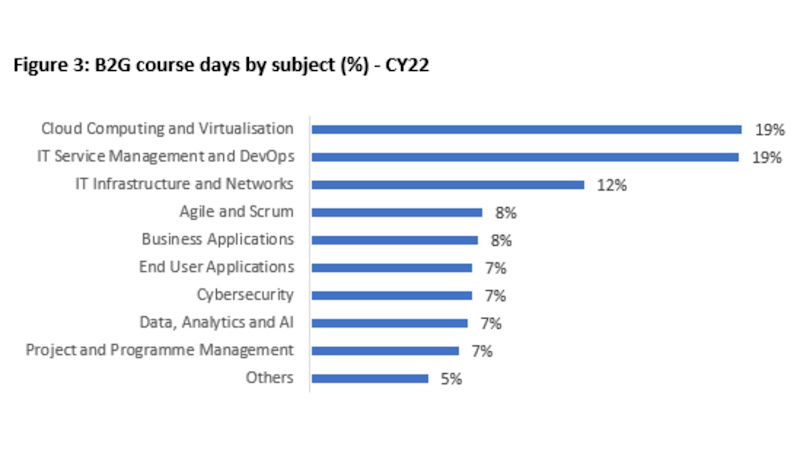The efficient management of IT services is crucial for the public sector's success. ITIL® provides a comprehensive framework for organisations to optimise their IT service management practices.
If you look up which government first published ITIL, you'll find that the framework was created under the auspices of the British government. ITIL was originally a registered trademark of the UK Government's Office of Government Commerce (OGC), before being acquired by Axelos and PeopleCert.
Given its origins, ITIL fits in naturally with public sector training and development programs.
How ITIL Training Supports Public Sector Agencies
We delve into the challenges that ITIL training can address for government agencies in New Zealand.
Standardising IT Service Management
One core challenge public sector organisations face in New Zealand is the need for standardised IT service management practices. This often results in a fragmented IT infrastructure, making ensuring consistency and interoperability between government departments and agencies challenging.Enhancing Service Delivery
Citizens and businesses expect prompt and reliable services from the public sector. But outdated IT processes and inefficient service delivery models often hinder meeting these expectations. ITIL training equips public sector professionals with the tools to identify and eliminate bottlenecks in service delivery. Well-implemented ITIL practices can transform service desks into efficient and user-friendly hubs, providing citizens with accessible and responsive support.
Implementing Change Management
Government agencies often need support with implementing IT systems or process changes. Without a structured approach to change management, projects may encounter delays, cost overruns and even failure. ITIL's change management practices instil discipline and accountability into introducing alterations to IT services. This results in reduced risks associated with changes, increased user acceptance, and seamless transitions, ensuring the public sector can adapt to technological advancements.Strengthening IT Security and Compliance
A top priority for the National Government is ensuring data security and compliance. But the growing number of cyber threats poses significant challenges here. ITIL training equips IT professionals with the knowledge to implement robust security practices, establish clear policies and develop comprehensive risk management strategies.Optimising Resource Utilisation
ITIL training offers insights into effective resource management, allowing organisations to allocate their IT assets efficiently. By identifying and eliminating redundancies, optimising hardware and software utilisation, and implementing ITIL's service asset and configuration management, the public sector can significantly reduce costs and maximise returns on IT investments.
ITIL training provides public sector organisations in New Zealand with a comprehensive framework to address various challenges in IT service management. As the country continues to invest in digital transformation, ITIL remains an invaluable asset for achieving the full potential of its IT capabilities in the public sector.
Access ITIL Courses for the Public Sector
Among our learners from the public sector, IT Service Management, specifically ITIL, ranks second in popularity and attendance.
As part of PeopleCert’s Continuing Professional Development Programme, from January 2023, all ITIL certifications will expire after three years and come with a renewal requirement. Learn about 2023 Updates to ITIL courses and certifications in this blog post.
Get insights on recommended ITIL courses below:
Managing Professional
The Managing Professional (MP) designation provides practical and technical knowledge about how to run successful IT-enabled services, teams and workflows. It is designed for IT practitioners working within technology and digital teams across businesses.
ITIL 4 Drive Stakeholder Value (DSV)
For IT professionals who foster relationships with stakeholders to co-create value. If service design, relationship management and customer/user experience are part of your accountabilities within Service Management, this course is for you. Drive Stakeholder Value benefits anyone who manages customer journeys, experiences, or expectations.
ITIL 4 Create, Deliver and Support (CDS)
For those who work in operations, supervisory and mid-management roles in Service Management. Or for current and aspiring ITSM managers. This is for IT practitioners and leaders who design digital products and services and who deliver and support them to agreed levels. This includes development, deployment, and monitoring activities.
ITIL 4 High-Velocity IT (HVIT)
Ideal for IT managers and practitioners who work in digital or highly automated environments or who deliver digital products and services. This includes anyone involved in digital transformation and in Lean, Agile, or DevOps ways of working.ITIL 4 Direct, Plan and Improve (DPI)
For anyone who needs to align their team’s objectives with the organisational strategy. Recommended for those in Supervisory and Managerial Roles involved in aligning team objectives with strategy, planning at any level and continual improvement.
Strategic Leader
The Strategic Leader (SL) designation recognises the value of ITIL, not just for IT operations but for all digitally-enabled services. Becoming an ITIL 4 Strategic Leader demonstrates that you have a clear understanding of how IT influences and directs business strategy
Digital and IT Strategy (DITS)
Designed and aimed at Business Managers and Leaders, enabling them to make informed decisions around the digital transformation of their business.
Practice Manager
The Practice Manager (PM) designation is for IT professionals aiming to establish good cross-practice collaboration and effective service value streams. Individuals can demonstrate their understanding and application of the concepts covered in the ITIL Management Practices at both strategic and operational levels maximising value from these practices.
Monitor, Support and Fulfil (MSF)
Equips professionals with the skills and knowledge to manage service delivery and enhance customer experience by applying concepts, techniques, and strategies to day-to-day tasks.Plan, Implement and Control (PIC)
Focused on the five practices that support effective planning, deployment, and management of services and assets, to ensure alignment with business objectives, minimise risk, and maximise value of assets through lifecycle management.Collaborate, Assure and Improve (CAI) - coming soon!
Lumify Group, the Public Sector and ITIL Training
Lumify Group provides ICT skilling for public sector workers through Lumify Work and Strategic Advisory support focused on logistics, supply chain management, process and programme and learning and development through Lumify People.
Lumify Work is a leading provider of corporate IT training with campuses across New Zealand. We offer ITIL certification courses across varying needs and skill levels.
We are an Accredited Training Organisation for ITIL courses by PeopleCert and a member of the IT Service Management Forum (itSMF).
Most of our ITIL instructors have Expert Level ITIL Certification and real-world ITIL implementation and ITIL consulting experience. We help you prepare for your ITIL Certification exams and implement ITIL successfully within your organisation.
Find out more about ITIL and ITSM by accessing our eBook. Contact our team to enquire about courses that support the upskilling and career development of Help Desk Managers, SDMs or other IT professionals.







